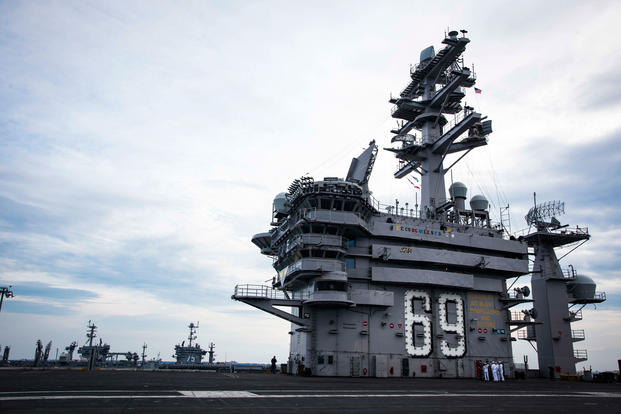Two aircraft carriers -- the Eisenhower and the Truman -- will remain in the Persian Gulf region as a warning to Iran against retaliation for U.S. airstrikes that "effectively destroyed" five weapons depots belonging to an Iranian proxy militia in Iraq, the top U.S. commander in the Middle East said Friday.
"We're going to keep [the carriers] for a while" to signal to Iran that retaliation would bring a massive response, Marine Gen. Frank McKenzie, head of U.S. Central Command, said at a Pentagon news conference.
He also said that the U.S. is in the process of moving Patriot anti-missile batteries into Iraq, adding it will be "some days" before they became operational.
There were no Patriot batteries in Iraq when Iran launched more than a dozen ballistic missiles at Al Asad Air Base in Iraq's Anbar province on Jan. 8, resulting in traumatic brain injuries to more than 100 U.S. troops, U.S. officials said at the time.
Related: US Strikes Iran-Backed Group Believed Responsible for Hit on Iraq Base: Pentagon
McKenzie did not discuss the types of aircraft that conducted the airstrikes or where they were based, describing their targets as five facilities used by the Kata'ib Hezbollah militia for storing weapons. No unmanned systems, or drones, were used, he said.
The weapons stored at the depots included 107mm Katyusha rockets of the type used Wednesday in an attack on Camp Taji in Iraq that killed two U.S. troops and a British medic, he said. Fourteen others were wounded.
The Defense Department on Friday identified the two U.S. troops killed as Army Spc. Juan Miguel Mendez Covarrubias, 27, of Hanford, California, and Air Force Staff Sgt. Marshal D. Roberts, 28, of Owasso, Oklahoma.
The British casualty was identified as Royal Army Medical Corps Lance Cpl. Brodie Gillon, 26, described by her commanding officer as "a larger-than-life soldier," according to the BBC.
Since October, U.S. positions in Iraq, including Camp Taji, located about 20 miles north of Baghdad, and the "Green Zone" in Baghdad, which houses the U.S. Embassy, have been hit more than 20 times by rocket attacks, according to U.S. and Combined Joint Task Force-Operation Inherent Resolve officials.
McKenzie said at least 12 of the attacks were attributable to Kata'ib Hezbollah, which is part of the Popular Mobilization Forces and nominally affiliated with the Iraqi security forces.
The rockets that hit Camp Taji came from a truck launcher that was later found by Iraqi security forces, but none of those responsible was apprehended, McKenzie said.
"You set the timer" for the rocket launches "and run away," he said. "Had we seen that truck, we would've taken action."
The airstrikes are expected to limit Kata'ib Hezbollah's ability to conduct future attacks, McKenzie said, adding "I would caution Iran and its proxies against an attempted response."
"We don't look for opportunities to attack," he said, but the U.S. "will respond to aggression."
McKenzie said it is his assessment that Iran does not seek a direct confrontation with the U.S. but will continue provocations through proxy groups in Iraq and elsewhere in the region.
"I think the threat remains very high," he said.
In another warning, McKenzie said U.S intelligence has a good fix on where the proxy groups are located. "We think we know where most of them are," he said. "There are plenty more places where we can go to work."
McKenzie said he has no way of knowing whether the Camp Taji attack may have been related to what would have been the 63rd birthday of Iranian Quds Force leader Qasem Soleiman, who was killed in a U.S. drone strike at Baghdad International Airport on Jan. 3.
He described Soleimani as a ruthless and effective terrorist leader who was difficult to replace by the Iran regime. "He's not there, and they miss him," McKenzie said.
He also noted that the coronavirus outbreak in Iran has taken a toll on the regime's leadership. "It's going to make it a lot harder for them to make decisions," he said.
On Friday, Iran's Tasnim news agency reported that Ali Akbar Velayati, a top adviser to Supreme Leader Ayatollah Ali Khameini, has shown symptoms of coronavirus and is quarantined.
Also on Friday, Iran's Health Ministry said the number of confirmed coronavirus cases in the country has passed 10,000, Tasnim reported.
-- Richard Sisk can be reached at Richard.Sisk@Military.com.
Read more: Guard Activations in Response to Coronavirus Expected to Hit 1,000 by Weekend












